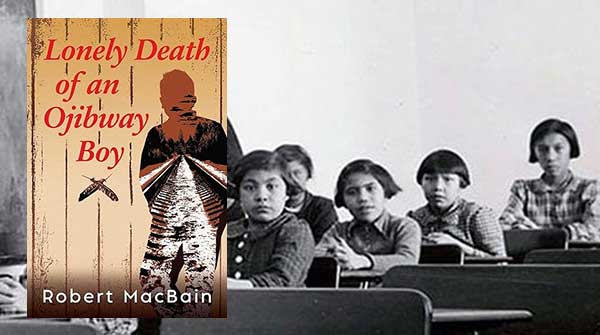Children are being taught that Charlie Wenjack was a residential school victim. New book debunks the myth
 What should reasonable people do when schoolchildren are told things that are untrue about Canadian history? Perhaps the question should be: What should reasonable people do when schoolteachers treat fictional material as if it were true?
What should reasonable people do when schoolchildren are told things that are untrue about Canadian history? Perhaps the question should be: What should reasonable people do when schoolteachers treat fictional material as if it were true?
Of course, reasonable people will say that false information should not be taught in schools. When it occurs, the misinformation should be corrected immediately.
Thank goodness the misinformation taught in Canadian schools for the past four or five years can be easily corrected.
Robert MacBain has authored a 230-page book, Lonely Death of an Ojibway Boy, that corrects the false information that has been written, sung, and spoken about the short life and tragic death of Charlie Wenjack. Remember the 12-year-old Ojibway boy who froze to death walking along the CNR rail track east of Kenora, Ont., in 1966? His name should be remembered because he is “the most famous Indian Residential School student in Canadian history.”
 |
| Related Stories |
| Trudeau should stop crying genocide and read this book
|
| 1889 book provides a way forward for Aboriginal policy today
|
Much of what school children (and their teachers) know about Charlie Wenjack is false. The reason is mainly because Gord Downie, lead singer for The Tragically Hip, wrote songs about this young boy that were played during his last concert tour and written down in a children’s book, Secret Path.
Downie depicts Charlie Wenjack as being abused sexually and physically in Cecilia Jeffrey Indian Residential School (C.J.) by Roman Catholic priests and nuns. The children’s book includes graphic drawings of nuns in habits delousing Charlie and other boys while a priest with a large cross on his chest drags a screaming Ojibway girl across the playground. This false narrative, unfortunately, is prescribed in many schools across Canada.
In clarifying the misinformation, MacBain reports, truthfully, that C.J. was managed by the Women’s Missionary Society of the Presbyterian Church of Canada and not by the Roman Catholic Church. Equally important, he reports that there is no evidence that Charlie was abused in the school.
Robert MacBain spent years collecting written and oral evidence from people who attended C.J. and from people who were employed in the school. He has 300 letters in his files and quotes many of them.
For example, a student’s mother wrote to the principal. (Spelling and grammar errors have not been corrected.)
Dear Sir,
We saw your letter which you wrote to us on Feb. 27. And we will (be) very happy if you could write to us once a month. And let us know how my little girl Mary is doing at school and if she is feeling well.
We want her to write to us too when you write to us. And we are very happy to hear that they get enough to eat.
Tell Mary not to get any trouble or wandering off from school.
You have our Big Thank You for looking after our little girl Mary so well.
My Best Regards.
May God Bless and Keep in a good path.
Yours truly
Four years before Charlie Wenjack froze to death trying to walk 600 km to his home community, in January 1962, Stephen T. Robinson, the principal, wrote a letter to parents:
Dear Parent or Guardian:
You will be interested in knowing that most of the children have been good and have done fairly well in their school work. You will find the school report enclosed. Those who have low marks will be given extra work so that the next report should be more favourable.
All the children who were not able to go home at Christmas were invited at some time during the holidays to the homes of white people in our community. I am sure you will be happy to know that they are very fond of your children and many have been invited back to the homes for either a weekend or for the Easter holidays.
You can be assured that we all love your children and do our best to help them to become good useful citizens who are proud of their Indian heritage.
Yours very truly.
Stephen T. Robinson,
Principal
There are many similar letters in MacBain’s files. In many letters, students called the principal and his wife “Mom” and “Dad,” and end their letters with “May God Bless You. Love.”
Unfortunately, little has been said about the false claims in Secret Path and several other stories about the death of Charlie Wenjack. Nothing is said about the many Indigenous staff members employed in residential schools. Would these employees have taken part in abusing children who were relatives or the children of friends? During the last year Charlie Wenjack was enrolled in C.J., the principal was Colin Wasacase, a Cree/Saulteaux man from the Ochopowace Band east of Regina.
As well, nothing is said about the fact that only one-third of the school-aged cohort of Indigenous children were enrolled in residential schools. Another third was enrolled in day schools, which were remarkably like public schools, and a third of the cohort did not attend school at all.
Even though there is considerable misinformation about Charlie Wenjack that is being used in Canadian classrooms, interested Canadians now have an opportunity to read a book challenging the misinformation about the short life and sad death of Charlie Wenjack. MacBain reports, “According to an article that was published in Maclean’s magazine in February 1967, the decision to run away was made on the spur of the moment.”
Even so, a charitable foundation named after Gord Downie and Chanie (Charlie) Wenjack is still presenting false information, and it was awarded $5 million in 2018 by the federal government to promote Secret Path by partnering “with educators and Indigenous communities to develop curricula for Canadian schools that accurately describe Indigenous history.”
No doubt MacBain will not be included in this partnership!
Nevertheless, teachers who use Gord Downie’s Secret Path in their courses must read Lonely Death of an Ojibway Boy by Robert MacBain so they do not misinform their students. The parents of schoolchildren should also read this book, and so should all Canadians. The misinformation taught in Canadian classrooms must be corrected as soon as possible.
Robert MacBain can be thanked for beginning the correction process in Lonely Death of an Ojibway Boy.
Rodney A. Clifton is professor emeritus at the University of Manitoba and a senior fellow at the Frontier Centre for Public Policy. He was the senior boys’ supervisor in Stringer Hall, the Anglican residence in Inuvik in the mid-1960s. His most recent book with Mark DeWolf is From Truth Comes Reconciliation: An Assessment of the Truth and Reconciliation Commission Report.
For interview requests, click here.
The opinions expressed by our columnists and contributors are theirs alone and do not inherently or expressly reflect the views of our publication.
© Troy Media
Troy Media is an editorial content provider to media outlets and its own hosted community news outlets across Canada.

